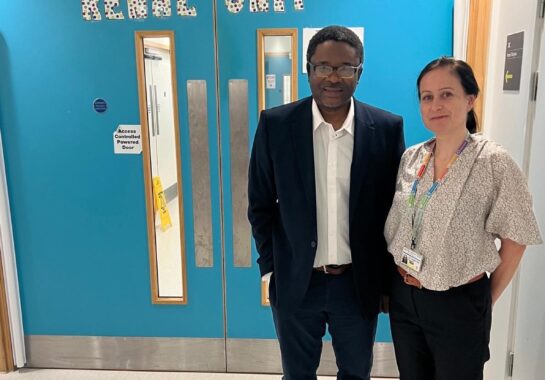Children don’t currently have fair access to kidney transplantation in Nigeria, and most children will die when they get chronic kidney disease. Roughly 500 children a year in Nigeria develop kidney failure, the extreme worst form of chronic kidney disease and less than 5 children a year can afford a kidney transplant.
There are very few dialysis centres in the country, and it has to be paid for by the family. A common scenario is that the average family can only afford 3 months of life saving dialysis.
We recently met with Dr. Emmanuel Anigilaje, Consultant Paediatric Nephrologist at the Nephrology Unit, Department of Paediatrics, University of Abuja, Abuja, Nigeria.
Emmanuel is graduating with a Masters degree with distinction at The University of Liverpool, in Organ Transplantation, which he started back in 2017 and his work has focused on mapping out a pathway to build a network to allow all children in Nigeria to get fair access to transplantation.
He was recommended the programme from a friend who spoke highly about the University and he knew it would give him the additional expertise and the knowledge he needed to bring change to children’s lives in his country.
Dr Anigilaje explained how kidney disease is a serious problem for children in Nigeria who have little access to treatment. The main reasons for this are due to a lack of healthcare funding for children with kidney disease which can force some families to go abroad for a kidney transplants.
There is also a lack of a trained transplant workforce dedicated for children, a lack of transplant infrastructure and an organ shortage. There is a desperate need to raise awareness to emphasise the importance of life saving transplantation.
His future vision is to establish a fair, government funded kidney transplantation programme for children that would be based in dedicated units in the six main regions in Nigeria.
His dissertation involved designing a strategy to bring kidney transplantation to children in Nigeria to act as a pathway for the community to follow. He explains; “We have established a kidney community including a group of paediatric nephrology colleagues who have been working together to drive solutions forward. We reviewed the medical literature to find solutions and we have used the Delphi method which is a process to get agreed decisions from a panel of experts. We’ve also been making connections internationally to help train a workforce and publicising our efforts in the hope of getting this vital service funded as a healthcare priority.”
Dr Anigilaje recently had a tour of Alder Hey Children’s Hospital with Dr Louise Oni and said; “I’m so glad I was able to work with Dr Louise Oni, Consultant Paediatric Nephrologist at Alder Hey and Senior Lecturer in Paediatric Nephrology at the University of Liverpool. Her supervision of my Masters degree has helped me to work towards something impactful for the children in my country. Alder Hey is a beautiful hospital with a lovely ambience. I hope one day that every child with kidney failure can access kidney transplantation no matter where they live.”
